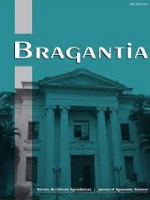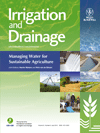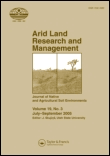
Terra Latinoamericana
Scope & Guideline
Exploring the Depths of Soil Science in Latin America
Introduction
Aims and Scopes
- Soil and Water Management:
Research focusing on soil fertility, soil erosion, and water quality, emphasizing sustainable practices to improve agricultural productivity without compromising environmental health. - Crop Production and Quality:
Studies examining the impact of various cultivation techniques, fertilizers, and biostimulants on crop yield, quality, and nutritional content, particularly in relation to local agricultural practices. - Environmental Impact Assessment:
Research assessing the effects of agricultural practices on ecosystems, including studies on pollution, biodiversity, and the role of natural resources in sustaining agricultural systems. - Innovative Agricultural Practices:
Focus on the development and evaluation of alternative agricultural practices, including organic farming, biostimulants, and integrated pest management to enhance sustainability. - Agroecological Systems:
Exploration of agroecological approaches that integrate ecological principles into agricultural practices, aiming to improve resilience and sustainability in farming systems.
Trending and Emerging
- Biostimulants and Organic Practices:
An increasing number of studies are investigating the use of biostimulants and organic amendments, highlighting a trend towards enhancing soil health and crop resilience without synthetic inputs. - Climate Change Resilience in Agriculture:
Research is increasingly focusing on the impacts of climate change on agriculture, including studies on plant responses to stress and adaptations in farming practices to ensure sustainability. - Soil Health and Microbial Communities:
There is a growing interest in the role of soil microbiomes and their impact on plant health and productivity, reflecting a shift towards understanding soil as a living ecosystem. - Precision Agriculture Technologies:
Emerging themes include the application of precision agriculture technologies, such as remote sensing and data analytics, to optimize resource use and improve agricultural efficiency. - Water Management Innovations:
Research on innovative water management strategies, including the use of wastewater and rainwater harvesting, has gained prominence, addressing the critical issues of water scarcity and quality in agriculture.
Declining or Waning
- Conventional Chemical Fertilization:
There has been a marked decrease in studies focusing on traditional chemical fertilizers, likely due to a growing interest in organic and sustainable alternatives that prioritize soil health and environmental safety. - Heavy Metal Contamination Studies:
Research on heavy metal contamination in soils and crops appears to be waning, possibly as a result of improved regulatory measures and practices in agricultural systems that mitigate contamination risks. - Pesticide Use and Management:
There is a noticeable decline in papers addressing the use of chemical pesticides, suggesting a shift towards integrated pest management strategies that emphasize biological control and reduced chemical dependency.
Similar Journals

Zemdirbyste-Agriculture
Bridging research and practice in the heart of Lithuania.Zemdirbyste-Agriculture is a prominent journal dedicated to advancing the field of agricultural sciences, with a particular focus on agronomy and crop science. Published by the Lithuanian Research Centre Agriculture & Forestry, this open access journal has been fostering knowledge sharing and scientific discourse since 2004, allowing researchers, professionals, and students unrestricted access to its content. Located in the beautiful country of Lithuania, specifically at Vytautas Magnus University, this journal plays a significant role in disseminating innovative research findings. With a 2023 Scopus ranking of #246 out of 406 in the category of Agricultural and Biological Sciences, Zemdirbyste-Agriculture falls within the Q3 quartile, reflecting its growing influence in the academic community. This journal, which has converged its publication focus from 2008 to 2023, aims to provide a platform for scientists to share their critical insights on agricultural practices, sustainability, and technological advancements in crop science, thereby contributing to the global discourse on food security and environmental health.

BRAGANTIA
Cultivating Insights for Agricultural ExcellenceBRAGANTIA, published by the Instituto Agronômico, is a distinguished open access journal that has been a vital resource since its inception in 1977. With an ISSN of 0006-8705 and E-ISSN 1678-4499, this journal is recognized for its contributions to the field of Agricultural and Biological Sciences, where it currently holds a respectable Q2 ranking as of 2023. Additionally, BRAGANTIA is indexed in various databases, supporting its impact within Materials Science (Q3 ranking). Positioned in Brazil, the journal promotes the dissemination of high-quality research, aiming to bridge the gap between academia and practical applications in agricultural innovation and sustainability. Researchers, professionals, and students looking to keep abreast of recent advancements and their implications will find BRAGANTIA to be an indispensable platform for sharing and accessing vital agricultural knowledge.

IRRIGATION AND DRAINAGE
Empowering agronomy with insights on irrigation and drainage.IRRIGATION AND DRAINAGE, published by Wiley, is a prestigious academic journal that focuses on the critical fields of agronomy, crop science, and soil science. With an ISSN of 1531-0353 and an E-ISSN of 1531-0361, this journal serves as an essential platform for disseminating innovative research and insights relevant to the management of irrigation systems and drainage in agricultural practices. Based in the United Kingdom, the journal has shown a significant impact in its field, boasting a 2023 ranking in the Q2 quartile for both Agronomy and Crop Science and Soil Science. It ranks #149 out of 406 in Agricultural and Biological Sciences for Agronomy and Crop Science, and #66 out of 159 in Soil Science, placing it within the 58th to 63rd percentiles. This journal not only aims to advance knowledge in the sustainable management of water resources and soil health but also encourages open access to its content, making significant findings more accessible to researchers, professionals, and students alike. As it approaches its convergence period from 2001 to 2024, the importance of IRRIGATION AND DRAINAGE in shaping effective agricultural strategies continues to grow, fostering dialogue and innovation among its readership.

Crop Forage & Turfgrass Management
Advancing agricultural practices for a sustainable future.Crop Forage & Turfgrass Management, published by WILEY, serves as an essential platform for researchers, professionals, and students in the fields of agronomy, crop science, plant science, and soil science. With a focus on advancing knowledge in the management of crops, forage systems, and turfgrass, this journal plays a pivotal role in disseminating innovative research and practical applications that drive agricultural sustainability and productivity. Despite its Q3 ranking in various agricultural and biological science categories according to Scopus, it aims to enhance its impact and relevance in the academic community through high-quality publications. As a journal converged from 2015 to 2024, it invites contributions that address contemporary challenges and solutions in crop management, ensuring accessibility to vital knowledge for the advancement of agricultural practices. Situated in the United States, it also reflects the diverse agricultural landscapes and practices of the region, making it a valuable resource for a global audience.

AGROCHIMICA
Cultivating insights for a resilient agricultural landscape.AGROCHIMICA is an eminent journal published by PISA UNIV PRESS, dedicated to advancing the fields of Agronomy, Crop Science, Food Science, and Soil Science. With a rich history dating back to its inception in 1973, this journal has evolved through various phases of publication, illustrating its commitment to delivering quality research over several decades. Although currently categorized in the Q4 quartile across its respective disciplines, AGROCHIMICA provides a platform for foundational and innovative studies that contribute to knowledge in agricultural practices and sustainable food systems. While the journal is not open access, it remains a valuable resource for researchers, professionals, and students interested in Italy's and the global agricultural landscape, fostering a greater understanding of the complexities within these interconnected fields. The ISSN associated with this journal is 0002-1857, and it is published from Pisa, Italy, addressing the evolving challenges in agriculture with a spotlight on rigorous scientific inquiry.

Revista de Agricultura Neotropical
Connecting Researchers to the Heart of AgricultureRevista de Agricultura Neotropical, published by UNIV ESTADUAL MATO GROSSO SUL, serves as a pivotal platform for disseminating research in the fields of agronomy and crop science. Since its inception as an open-access journal in 2014, it has been dedicated to promoting innovative research and practical applications within the agricultural sector, specifically tailored to the challenges and dynamics of the tropical agriculture landscape in Brazil and beyond. Although currently positioned in the Q4 quartile of Scopus rankings, and with a modest agricultural science percentile, the journal actively encourages contributions that highlight sustainable agricultural practices, tropical crop management, and emerging technologies in farming. With its commitment to open access, the Revista de Agricultura Neotropical broadens the reach of critical knowledge, making it accessible to researchers, professionals, and students alike, thus fostering a collaborative environment for advancing agri-scientific initiatives.

Journal of the ASABE
Driving Collaboration in Agricultural and Biological EngineeringJournal of the ASABE, published by the American Society of Agricultural and Biological Engineers, serves as a pivotal platform for disseminating cutting-edge research in various disciplines, including Agronomy, Crop Science, Biomedical Engineering, Food Science, Forestry, and Soil Science. With an impact factor that reflects its significance and reach, the journal ranks in the Q2 and Q3 quartiles across numerous categories in 2023, showcasing its commitment to advancing knowledge in agricultural and biological engineering. Authored by leading experts, the journal offers accessible articles on innovative methodologies, technologies, and sustainable practices essential to the global agricultural and environmental landscape. Open access options ensure that research findings are readily available to a broad audience, promoting collaboration and knowledge sharing among researchers, professionals, and students alike. With a strategic focus on research convergence into 2024, Journal of the ASABE is poised to shape the future of engineering solutions in agriculture and beyond.

ARID LAND RESEARCH AND MANAGEMENT
Fostering collaboration for effective arid land stewardship.ARID LAND RESEARCH AND MANAGEMENT is a leading journal in the field of Soil Science, published by Taylor & Francis Inc in the United Kingdom. With a focus on the sustainable management of arid and semi-arid lands, this journal aims to bridge the gap between scientific research and practical application. It garners a respectable impact factor, categorically positioned in the Q2 quartile within its field and ranks 59th out of 159 in Scopus, representing the top 63rd percentile of journals in Agricultural and Biological Sciences - Soil Science. As an essential resource for researchers, practitioners, and students alike, ARID LAND RESEARCH AND MANAGEMENT publishes high-quality, peer-reviewed articles that cover a wide range of topics, from soil conservation techniques to innovative land management practices. Open access options are available, facilitating broader dissemination of knowledge critical to addressing global challenges associated with arid environments. Targeting a pivotal area of study, this journal plays a significant role in advancing the understanding and management of these unique ecosystems, making it a valuable asset for anyone engaged in environmental sustainability.

POTATO RESEARCH
Uncovering the potential of the humble potato.POTATO RESEARCH is a prestigious journal dedicated to advancing the scientific understanding of potato cultivation and its wider implications in the fields of agronomy, crop science, and food science. Published by Springer in the Netherlands, this journal boasts an impressive impact factor and ranks in the Q2 category for both Agronomy and Crop Science, as well as Food Science in 2023, affirming its significant contribution to these disciplines. With over five decades of research converged from 1970 to 2024, POTATO RESEARCH serves as a vital platform for researchers, professionals, and students interested in the latest findings and innovations that affect potato production and processing. Although it is not an open-access journal, it remains a crucial resource for those dedicated to enhancing agricultural sustainability and food security. For inquiries or submission details, please refer to their office located at Van Godewijckstraat 30, 3311 GZ Dordrecht, Netherlands.

AGRONOMIA MESOAMERICANA
Advancing agricultural knowledge for a sustainable future.AGRONOMIA MESOAMERICANA is a distinguished open-access journal published by UNIV COSTA RICA, dedicated to advancing knowledge in the fields of agronomy, crop science, food science, and soil science. Since its inception in 1990, the journal has provided a platform for researchers and professionals to disseminate their findings, contributing significantly to the agricultural sciences. With an E-ISSN of 2215-3608, it operates from Costa Rica, specifically from the Centro Investigaciones Agronómicas, situated in San José. Despite its current classification in the Q4 quartile for 2023 in the respective fields, it aims to stimulate academic discourse and inspire innovative solutions to pressing agricultural challenges. The journal attracts a diverse audience and encourages submissions that focus on sustainable practices, food security, and environmental stewardship, making it an essential resource for researchers, professionals, and students alike seeking to enrich their understanding and share crucial insights in the agronomy landscape. Open access ensures that all published research is freely available, fostering collaboration and knowledge exchange worldwide.